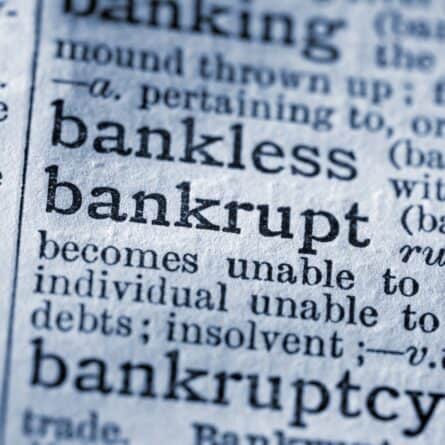
Life After Bankruptcy: Managing and Minimising the Impact
Facing financial challenges can be an overwhelming experience and for some, bankruptcy becomes a necessary step toward regaining control of their financial well-being. While bankruptcy can provide relief from debt, it also has significant implications for your financial future. However, it’s important to remember that life after bankruptcy is not a dead end; it’s a fresh start. With thoughtful planning, responsible financial management and the guidance of our experience and compassionate team at Wisdom Business Consultants, you can navigate the journey of rebuilding your financial stability and minimise the impact of bankruptcy.
The Bankruptcy Process
Bankruptcy is a legal process designed to offer individuals and businesses relief from serious debt by surrendering assets. With it often comes the relief of the mental and emotional burden of overwhelming debt. Once bankruptcy has been declared, a trustee is appointed to manage your assets and affairs by selling off eligible property and dividing the funds among creditors. Bankruptcy typically lasts for three years and one day.
Understanding the Impact of Bankruptcy
While bankruptcy provides much-needed relief from overwhelming financial obligations, it also leaves a lasting mark on your financial history:
- Credit Score: Bankruptcy can significantly lower your credit score, making it more challenging to obtain credit or loans in the future as you may be considered a ‘high risk’ borrower. Bankruptcy is listed on your file with credit reporting bureaus for:
– 5 years from the date you became bankrupt or
– 2 years from when your bankruptcy ends, whichever is later.
- Public Record: Following bankruptcy, your name will appear permanently on a public register called the National Personal Insolvency Index (NPII), potentially impacting your reputation in certain professional and social circles.
- Employment and Housing: Some employers and landlords may inquire about your bankruptcy history, potentially influencing hiring decisions or rental applications.
- Travel: While travel within Australia is unaffected after bankruptcy, there may be restrictions on your ability to travel internationally. Often international travel will require approval from your trustee, even if it’s work-related.
- Emotional Wellbeing: Dealing with the weight of financial distress, uncertainty, and the stigma associated with bankruptcy can lead to heightened stress, anxiety and feelings of shame. This can lead to strained relationships, low self-esteem and a sense of isolation. It’s important to recognise that the emotional toll of bankruptcy is significant and seeking support from loved ones and health professionals can play a crucial role in navigating these complex feelings and fostering a path towards recovery and mental resilience.
Managing and Minimising the Impact
While the aftermath of bankruptcy can be daunting, there are proactive steps you can take to manage and mitigate its impact:
- Create a Budget: Develop a detailed budget that outlines your income, expenses and debt repayment plan. A budget helps you regain control of your finances and avoid falling back into debt.
- Build an Emergency Fund: Prioritise building an emergency fund to cover unexpected expenses, reducing the need to rely on credit.
- Rebuild Credit Wisely: Consider obtaining a secured credit card or a credit-builder loan to start rebuilding your credit history. Make timely payments and keep your credit utilisation low.
- Live Within Your Means: Focus on living below your means to ensure that your expenses align with your income. Avoid unnecessary splurges and focus on long-term financial goals.
- Set Realistic Goals: Set achievable financial goals, such as saving for a down payment, investing for retirement, or funding education. Having clear goals can provide motivation and direction.
- Stay Informed: Regularly monitor your credit report to ensure its accuracy and track your progress in rebuilding your credit history.
- Seek Financial Guidance: Consult with our experienced team at Wisdom Business Consultants to create a comprehensive financial strategy. We can provide tailored advice on rebuilding credit, managing debt and making sound financial decisions.
Bankruptcy is a challenging chapter in your financial journey, but it doesn’t define your entire financial future. With dedication, discipline and the expert guidance of our experienced consultants at Wisdom, you can effectively manage and minimise the impact of bankruptcy. By adopting responsible financial habits, rebuilding your credit over time and prioritising sound financial decisions, you can embark on a path toward a brighter and more secure financial future. Remember, life after bankruptcy is an opportunity to build a strong foundation for lasting financial well-being.

